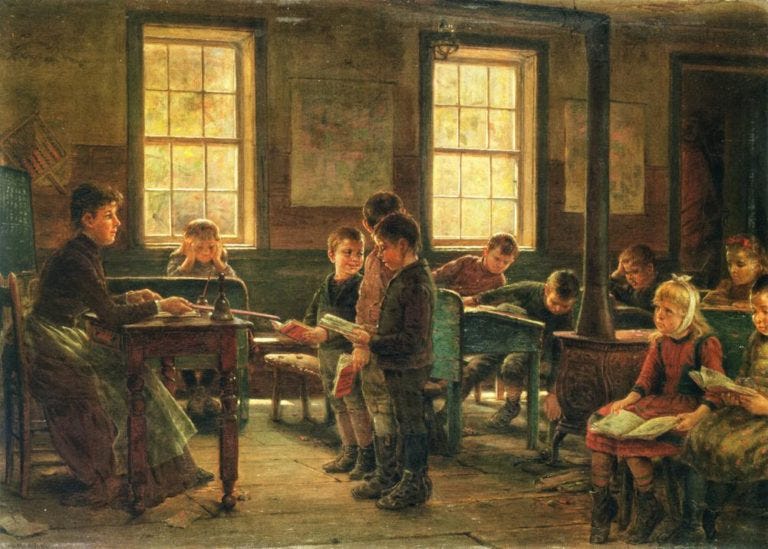Kids Recover From Missing School Because The Other Kids Forget
And we should legalize child labor

Scott Alexander of Astral Codex Ten and Slate Star Codex recently made a post entitled “Kids Can Recover From Missing Even Quite A Lot Of School” which argued that missing school is not a big deal for students because they are quickly able to catch up to other students. He uses children who miss school due to cancer, teachers strikes, changes in law, Hurricane Katrina and other events as evidence. These students did not have significant lasting impact on their education, demonstrating that missing school is not a big deal. Scott’s point seems to be that keeping your kid out of school for their own safety during COVID-19 is okay because there will likely not be long-term effects.
The more interesting question is why this is happening. Prior to deleting my youtube channel and remaking it, I had a video in which I suggested that COVID-19 school closures and reduction of quality in schooling will serve as a test of the Signaling Theory of Education. I learned about this model of education from George Mason Economist Bryan Caplan's book The Case Against Education. The Signaling Theory of Education tells us that education primarily serves as a signal rather than as a tool for increasing human capital.
The typical view of education is that it helps you learn knowledge and skills. You take those knowledge and skills and use it to be better at your job. Employers know that people who are educated have better knowledge and skills so they pay them more. And knowledge and skills helps you be productive, so economies with lots of knowledgable and skillful people are productive. This is intuitive.
The signaling theory says this is mostly wrong. What is actually going on is that people are using education to tell employers something about themselves. Education shows that people are intelligent, conscientious and conformist. If you cannot finish college, despite the monetary incentive, then you probably are not as smart or conscientious or conformist as those who do. These traits are desirable and education is a way of seeing that people have them. You could try to show you are smart with your SAT score and skip college, but that would make you look lazy and non-conformist.
Countries that are wealthy are wealthy largely despite spending so much time on education instead of because of it. Of course, there will be variation across different majors and years of schooling. The skills acquired in 1st grade are largely human capital and necessary, whereas the skills acquired in high school are often much more signaling.
A good reason to think that the information learned in school is not good for helping one become a more productive worker is because the information is not remembered. People forget information quickly if its not reinforced. You cannot use information that you do not know. Whatever is remembered is reinforced on the job but frequently that is specialized knowledge that was not acquired in school. A great deal of general course requirements from college are of absolutely no use.
If the information from school is quickly forgotten, then it makes sense that students would recover quickly to catch up with other students. The other students do not remember the information and neither does the kid that never learned it. Furthermore, all students having a worse education would not hurt because signaling is relative to peers. If all students take a year off, we would not expect to see much difference in the productivity of the economy.
The implication of this seems to be to massively improve the school system to have labor market relevant skills and continually reinforce learning so students do not forget. I do not anticipate that happening, so I believe it is an ethical imperative to allow students to escape the system. While it is individually harmful because it signals negative personality traits, many people leaving school on a massive scale would be more productive to the economy than harmful. I think that as long as a student has basic skills such as literacy and numeracy, and maybe even before that, students should be allowed to leave school and work. We ought to legalize child labor.



Very interesting thoughts. I'm always open to a discussion of how this culture educates the next generation.
My partner and I chose to homeschool our children, and the desire to continuously improve our methods is always on my mind. There is immense pressure to conform to an idea of "classroom" learning, but I don't think that is the best way. Sometimes I wonder what would happen if we took a year off from book learning and just watched educational YouTube videos with our kids, following whatever paths of inquiry the kids suggest.
I'm all on board with legalizing child labor. Unfortunately, society hears that phrase and immediately thinks "oppressive / exploitative child labor". It's a struggle to get people to think objectively about the concept.
I know one family who plans on not considering their homeschooled children "graduated" until they've worked at least six months at a customer-oriented or service job. This would happen in the late teenage years, though, so it's not exactly "child" labor.